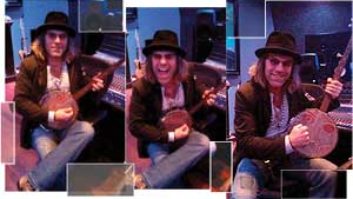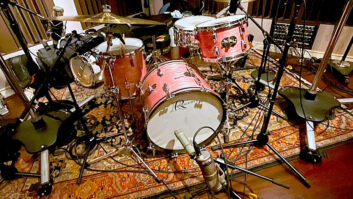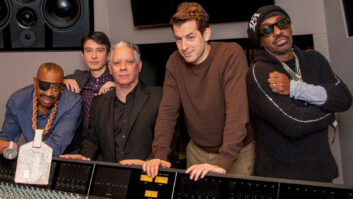There’s a theme found in many popular self-help books that goes along the lines of “if you want to be truly happy and prosperous, then follow your muse and do what you really love.” Byron Gallimore, one of country music’s hottest producers, could easily be the poster boy for this motto. Over the past five years, Gallimore has been involved with (at last count) 15 Number One singles and sales of more than 15 million albums for artists including Tim McGraw, Faith Hill, Jo Dee Messina, Randy Travis, Ty Herndon and Jessica Andrews, among others. Yet all the success that has come his way is simply a great bonus for Gallimore, a man who really dives into his work every day for the sheer love of it.
Gallimore, who was raised on a farm near the West Tennessee town of Paris, started playing music in local bands in his teens but eventually turned his focus primarily to songwriting. His hard work at that craft paid off when he won the first Music City Song Festival, which led to a publishing deal with Dick James Music, where he scored a couple of Top 10 country hits. By the late ’80s, Gallimore had left his farm and moved to Nashville where he worked for the Charlie Pride Music Group as a writer and A&R person, signing and developing songwriter/artists such as Jo Dee Messina.
It was there that Gallimore realized that as much as he liked songwriting, he truly loved recording, arranging and mixing music. Over time, he wrote less and less and spent more energy in the publishing company’s studio, producing tracks for songwriters and then shopping them to labels. In time, the buzz on Music Row was that Gallimore had a knack for helping artists get deals. Along with the help and support of Charlie and Roscene Pride (at Pride Music Group), Gallimore also received a lot of guidance from producer James Stroud, who opened doors that enabled him to leap from cutting publishing demos to major- label album projects.
One of the first co-productions Stroud and Gallimore undertook was Tim McGraw, now one of the biggest stars in country music, with more than ten million albums sold and 11 Number One’s. It’s been nonstop ever since. When Mix caught up with Gallimore at Ocean Way Studios in Nashville recently, he was wrapping up mixes on Randy Travis’ next album and producing sessions on a new Brooks & Dunn effort.
Like a lot of successful producers, you developed a lot of your initial song smarts playing clubs in cover bands.
It was a great education. You learn what the people want to hear. Everybody [whose songs] I played onstage in a band were my influences, and that ranges from George Strait to Stevie Wonder, Eagles, Doobie Brothers and things like Southern rock. I think this had a lot to do with me starting to write songs and sending them to Nashville. I realized that I wanted to do more.
I had always tinkered with writing, but I remember consciously making an effort and going in and buying three or four books on songwriting and reading them front to back. There are tricks that I would do, like go buy Hit Parader, and go to the back of the magazine where I wouldn’t know the songs. I would look at the title and not look at the lyrics and try to figure how they would write a chorus that you could sing along with. Then I would look at it and see if I was getting close. Then I would try to figure out how they would create the verses. I would study these other songs to try to learn the craft. Within a year, I had won the Music City Song Festival. It was actually a song called “No Ordinary Woman.” There was a $10,000 prize, and everybody where I lived thought it was a big deal, including me.
[Laughs]
Did winning that competition help generate any activity for you in Nashville?
Kay Smith and Lyn Schultz decided to put in some calls for me, and I started in town with Dick James Publishing; that deal came as a result of winning that song festival.
Dick James wanted me to be an artist, because I always sang, but I didn’t have my heart into it 100 percent. Quite honestly, I think I would’ve done very well songwriting. I had two Top Ten singles, The Forrester Sisters “Love Will” and Charlie Pride with “Every Heart Should Have One.” I ended up working with Charlie as a result of this song, which was around the mid-’80s. I had a few cuts, but I got distracted.
In what way?
I would be writing a couple of songs a week, and then I’d go back home to West Tennessee and make demos. I soon realized that I was writing songs just to try out different things on the demo. That’s when I found out what I really loved doing. It was like painting pictures. That’s really when I came alive and learned I was hooked into trying to make records.
I wrote for the Charlie Pride Music Group for about three years, eventually taking a job running the publishing company for them. We were signing writers who wanted to be artists, too. I got involved in working on their demos, and I started writing less and less, until I was getting up every morning trying to figure out how to get the end product on this artist sounding good, so I could run over and pitch it to some of the record labels. This was something that I loved doing, just like I love to go fishing or go play golf.
Several of them ended up getting deals, one of them being Jo Dee Messina, who I started working with around 1991. I didn’t get to produce any of those artists, but that was kind of the way it was, back in those days. The record label usually felt like I wasn’t ready, and the truth is, I wasn’t ready back then. I was somewhere climbing up this ladder getting ready to do this thing. This kept going on and going on. After a while, people started coming around and looking at me as a producer.
Tim McGraw resulted from that kind of buzz.
That’s right. I went to see Tim around late 1992 at a Nashville club on Broadway called Diamond in the Rough. We hit it off great and he was into working with me, but then we ran into a stumbling block with Curb [Records]. I called James [Stroud], and he was kind enough to do the project with us. I owe James so much for giving me that opportunity.
Was there much pressure for you, making the transition from doing your own self-made demos on your own time clock to going into big-budget major label projects?
The first sessions I did in this town were harder. When you’re new and all those great session musicians don’t know who you are, they’re maybe wondering “What’s this guy know?” I do know that there was a learning time for me, trying to figure out how to deal with all of those kinds of things, and sorting through the people who I got the best work or help from, to get results I was happy with. It was very different from playing all the parts and having all of the time in the world.
You mentioned that Jo Dee Messina was one of those you worked with at Pride years ago. Now, she’s enjoying incredible success with a string of Number One hits. That’s got to feel good to see your collaborative vision and hard work validated so nicely.
Jo Dee was pitched for three years. The first time I got a pass on Jo Dee, I didn’t quit. I just kept going in and cutting sides. We cut like 15 things before it was all over. To me, it isn’t just about going in and giving your time and asking to be paid for it. I wasn’t hitting people for producer fees. I never did that for any of these acts. It was more like, “give me the opportunity,” and even when they didn’t get that record deal early, you don’t quit there. You have to keep going, if you believe in that artist. Keep cutting and eventually something will happen. People around town will start saying, “They won’t leave us alone. They really must believe in this.” Then they might look back and start taking it seriously.
Tim McGraw co-produced Jo Dee with you.
Tim always loved her singing, and he would say, “If you ever get her a deal, please let me work with you on it.” I pitched just one song of Jo Dee’s to Curb, and she was signed off of that. So I told Tim about it, and he said, “I’d still love to work on it,” and I said, “Absolutely.” I didn’t even think about it.
These days, radio loves Jo Dee. She has had eight weeks at Number One this year. This is the same person who last year, there were people who would’ve written her off. I knew not to write her off, because we knew how talented she was. We were preparing a great album on her, and making sure she had enough hits on the album to sustain things.
So what do you define as a hit?
To me, it’s when I’m riding down the road in my car and it feels like it did when I was 15 years old, and I don’t have to think about it and I just like it. That’s the way I felt the first time I heard “Sweet Home Alabama” or “My Girl” or whatever. It doesn’t matter, but I’ve got to have that “feeling” about it.
My wife, Missi, listens to songs for me all of the time, and we go to the Waffle House every morning and listen to five or six songs from about 30 or 40 songs that she has picked out the day before. She’ll say all the time, “You’re not even listening!” I’ll say, “If I’ve got to listen that darn close, then it must not be a hit.” I kind of stick by that. It’s got to wake me up real quick, and I’ve got to like it musically, like the way I loved “China Grove” or “Peaceful Easy Feeling.” I don’t know what the words are the first time I hear it, but I know I love the melody and something sticks with me. Then I’ll go back, and listen to it in relation to the artist and say, “Is this idea completed, and is it well-written?” Then I think, “Is this something the artist would say? Is it hip enough for them or country enough?” Whatever the parameters are, you’ve got to learn that.
The more you can know your artist the better. I like going to song meetings with artists and hearing them pass on songs, because you get a vibe really quick on what they like and don’t like. So my job and Missi’s job is to find songs that the artist will be happy with, and to find a great song.
Even though you are known for your work in the country market, your production of Faith Hill’s “This Kiss” was a Top 10 pop hit, as well as a huge country hit.
I heard a hit song when I heard “This Kiss.” The original demo didn’t have all that layering, but it had that hooky chorus. A lot of work went into that rascal, until everyone was happy. If something doesn’t quite work, we will go back and re-do it in a minute. Everything has got to glue together, and if it doesn’t then we have to figure out what is wrong. I’ll work forever on a song, until I get it right. A lot of times, I’ll turn the clock off and never even turn those hours in to the labels or the artist, because there is no way to. It would be stupid.
The single sold a million copies, and the album is close to triple Platinum. This is the first album I’ve done with Faith. It was a long time putting it together. We’ve been working together for over two years now, and it has been unbelievable. Faith is really good at what she does, and she’s able to communicate ideas to me. She has a lot of great ideas.
What do you look for in a vocalist?
I’ve always been after the stylist, more than someone who can do vocal acrobatics. There are a lot of really great singers who are not great stylists in country music. It’s very important that a singer sounds unique when you’re looking for talent out there. That’s true whether it’s country or alternative or anything. You didn’t have to hear two lines of Michael McDonald or Kenny Loggins to know that it was either of them. They’re phenomenal stylists.
Do you have any advice for upcoming producers, especially those interested in working in Nashville?
Don’t be disappointed when you don’t get to produce the first two or three projects you shop. That maybe isn’t as much true in the pop world as it is in country, but each step in your career is a stepping stone to the next one. I have found that to be true every time-one thing leads to another.
If you come into this expecting anything, you’re probably going to be disappointed. If I had come into this from a money or business standpoint, I would’ve long ago tucked in my tail and gone back to West Tennessee.
I learned this from years of writing songs and having them passed on. When someone calls you and says, “Your song is on hold,” and then two weeks later your song isn’t on hold, you build up this coat of armor. It’s a tough business, and you get to where you don’t expect anything. Even when they tell you, “Your single is coming out tomorrow,” it’s like “I’m not going to plan on that.”
When we released Tim McGraw’s second album, Tim was selling over 100,000 units a week. It didn’t soak into me at all. We would go eat at a restaurant called Jamaica’s, and everybody would come up and go, “Congratulations! Do you know what is happening to you?” I really didn’t know. It was like I had some kind of shield around me.
I carry that from being raised on a farm. Farming is a great life, but it teaches you that you may not get rain when you really need a rain. You learn to not expect things to happen. You can have a beautiful crop of corn out there and wait all summer for a rain and end up with half a corn crop. It is those things that helped prepare me. Still, you don’t care, if you love what you are doing.
Now you’re working with Brooks & Dunn.
I’ve never worked with Ronnie and Kix before. I got a call from Tim Dubois saying “I need to talk with you about something.” I went to his office, and he asked me if I would be interested in doing half of the album. That was one of those things where I didn’t have to think about it. I’ve always loved those guys’ music. I saw them live with Reba one time and thought they had a great live show.
James [Stroud] and I are currently producing Randy Travis for Dreamworks, and that has been fun. We tracked the album in Santa Fe, where he has a home. He’s always doing movies and he moves around a lot, so we had to find a place to catch him. We then went to his place in Hawaii, on another one of his little vacation breaks, and set up in his weight room, and Randy did the vocals in a bedroom. We brought three Sony [digital] 8-tracks. We carried the [instrumental] tracks on eight tracks, then had eight tracks for him to sing, and then we had the third 8-track in case one of the machines went crazy and to back up stuff, too. James and I played golf every morning and then went in to record. We were over there for six days, but Randy sang 13 songs in two afternoons. He is unbelievable. He has that country thing that so few people do.
Julian King, who has engineered for James and me for a long time, was the engineer. John Guess is mixing for us now. Chris Lord-Alge and Steve Marcantonio have also mixed on a lot of stuff for us on projects, as have Julian [King], Russ Martin and Marty Williams.
What other new projects are in the pipeline?
Jessica Andrews is a new act on Dreamworks. She’s a phenomenal singer who has a song out on the Lion King soundtrack called “I Will Be There for You.” We’ve been in pre-production for the last year-and-a-half. Be watching for her. There’s also a new group on Curb called the Clark Family that is absolutely great. We’re trying to get an album out by January of next year.
It’s been amazing this last year or two, with “This Kiss” working for Faith and Jo Dee being so hot, and with Tim, who had the CMA Album of the Year this year. All three of those guys have been smoking. The calls that have come in over the last year are great.
I don’t want to ever be so busy that I let down any of the artists I’m working with. I want to give them 100 percent. It’s a real balancing act, but it seems to be really moving ahead. I’m so grateful to be working with all of these fine people. What can you say but I’m a lucky man.




